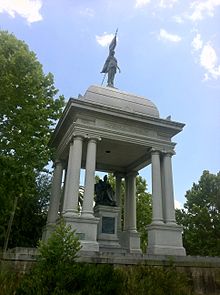Springfield (Jacksonville)
| Springfield | |
|---|---|
| Neighborhood of Jacksonville | |

|
|
| Location within Central Jacksonville | |
| Coordinates: 30°20′39.9″N 81°39′18.8″W / 30.344417°N 81.655222°W | |
| Government | |
| • City Council | Dr. Johnny Gaffney |
| • State Assembly | Reggie Fullwood |
| • State Senate | Audrey Gibson |
| • U.S. House | Corrine Brown (D) |
| Area | |
| • Total | 2.53 km2 (0.978 sq mi) |
| • Land | 2.53 km2 (0.978 sq mi) |
| Population (2008) | |
| • Total | 4,674 |
| • Density | 7,925/km2 (20,525/sq mi) |
| ZIP Code | 32206 |
| Area code(s) | 904 |
| Website | myspringfield.org |
|
Springfield Historic District
|
|
| Location | Jacksonville, Florida, US |
| Built | 1880s through 1920s |
| Architectural style | Late 19th- and 20th-century revivals Prairie School Colonial Revival Queen Anne |
| NRHP Reference # | 86003640 |
| Added to NRHP | January 22, 1987 |
Springfield is a historic neighborhood of Jacksonville, Florida, United States, located to the north of downtown. Established in 1869, it experienced its greatest growth from the early 1880s through the 1920s. The Springfield Historic District is listed in the National Register of Historic Places, and contains some of the city's best examples of 19th and early 20th century architecture.
The boundaries of Springfield are well defined. Hogan's Creek lies along its south edge, and railroad lines are found on the north and east. Boulevard defines the western limit of the district where a later commercial strip abuts the earlier residential area. Contemporary with the overall residential area are two commercial strips along Main and Eighth Streets which join at the heart of the district. The district contains 119 city blocks in an area of approximately 500 acres (2 km²), or slightly less than one square mile. Hogan's Creek separates the residences of Springfield from the downtown business district. North of the creek few buildings rise above two stories and parks and tree lined streets are common.
The blocks of the historic district are laid out in a regular grid, with named streets running north and south and numbered streets east and west. Most of the blocks have alleys, usually arranged in an "H" pattern, although other configurations are found. A few streets retain their original brick pavers and granite curbstones, but the majority are now covered with asphalt and have concrete curbs. Sidewalks feature both the earlier hexagonal pavers and modern poured concrete sections. Trees lend considerable distinction to the neighborhood. Oaks predominate. Scattered throughout the neighborhood are such decorative elements as hitching posts, cast iron fences, rusticated concrete block walls, and carriage stepping stones, testimony to the area's turn-of-the-century origins. There is, however, no great concentration of such elements.
Springfield was established as a residential community in 1871 by developer John H. Norton. Its concentrated physical development began about 1882 with the formation of the Springfield Development Company and accelerated after a fire that destroyed much of downtown Jacksonville in 1901. The Great Fire of 1901 consumed much of central Jacksonville, leaving many of the city's most prominent and wealthy citizens homeless. Smoke from the fire was reportedly so heavy it could be seen as far away as North Carolina. The fire lasted 8 hours and consumed 146 city blocks, 3268 buildings, and killed seven people. After the fire, many of the Jacksonville's residents who lost homes in the fire relocated to Springfield.
...
Wikipedia

